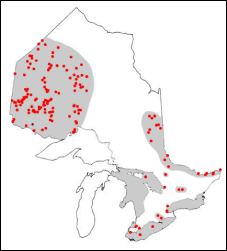Sauger
Information about the Sauger (Sander canadensis), a cool-water fish native to Ontario.

Species image (Illustration Credit: U.S. Fish and Wildlife Service)
What it looks like
- large, elongated body
- grey to brown back with 3-4 darker brown saddles
- paler sides, often with darker brown blotches or round spots
- white belly
- distinct blotches or bands on adults
- lacks the walleye’s white tip on lower tail fin
- spots on dorsal fin, unlike walleye
- separate spiny and soft dorsal fins
- large mouth extends below back edge of pupil
Size
- length: 25-41 centimetres (10-16 inches)
- weight: 0.2-0.9 kilograms (0.5-2 pounds)
- Ontario record: 2.0 kilograms (4.4 pounds)
Similar fish
Where it’s found

Species distribution map (modified from Mandrak and Crossman, 1992)
Range
- throughout Ontario, especially central, northeastern and northwestern Ontario
- use Fish ON-Line, an interactive mapping tool, to find specific lakes and rivers
Habitat
Sauger and its cousin, the walleye, enjoy similar habitats:
- murky lakes and large rivers
- soft mud bottoms to flooded timber, rubble or bedrock
- preferred cover – weed, wood, rock
Angling tips
- walleye avoid light—best times to fish are morning and evening, and cloudy or overcast days
- take almost any bait or lure in spring, and feed well in fall
- more challenging to catch in summer
- cast or troll with spinners or minnow-imitating plugs
- troll with worm harness rigs of spinners and beads
Common baits
- jigs tipped with soft plastics, live bait or bucktail
- minnow imitating plugs
- minnows, earthworms, crayfish
Updated: January 19, 2023
Published: July 18, 2014